|
Books Should Be Free Loyal Books Free Public Domain Audiobooks & eBook Downloads |
|
|
Books Should Be Free Loyal Books Free Public Domain Audiobooks & eBook Downloads |
|
Top Authors |
|---|
|
Book type:
Sort by:
|
By: Stephen Crane (1871-1900) | |
|---|---|
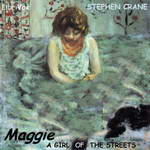 Maggie: A Girl of the Streets
Maggie: A Girl of the Streets
Stephen Crane’s first novel, Maggie: A Girl of the Streets has been called “the first dark flower of American Naturalism” for its distinctive elements of naturalistic fiction. The chief character, Maggie, descends into prostitution after being led astray by her lover. Rather than focusing on those that make up the very rich or middle class, the novel highlights the deplorable living conditions of the working class during the so-called Gilded Age in New York’s Bowery. | |
 Selected Short Stories
Selected Short Stories
At the time of his death at the age of 28, Stephen Crane had become an important figure in American literature. He was nearly forgotten, however, until two decades later when critics revived interest in his life and work. Stylistically, Crane's writing is characterized by vivid intensity, distinctive dialects, and irony. Common themes involve fear, spiritual crises and social isolation. Although recognized primarily for The Red Badge of Courage, which has become an American classic, Crane is also known for short stories such as "The Open Boat", "The Blue Hotel", "The Bride Comes to Yellow Sky", and The Monster... | |
 War is Kind (collection)
War is Kind (collection)
Published in 1899, just a year before his death, War Is Kind by Stephen Crane evokes again the dark imagery of war which made his fortune in The Red Badge Of Courage. Unlike that book, this collection leaves the battlefield itself behind to explore the damage war does to people’s hearts and minds. Reeking of dashed hopes, simultaneously sympathetic with the victims of war and cynical about the purposes of war, Crane implicitly criticizes the image of the romantic hero and asks if Love can survive... | |
By: Anicius Manlius Severinus Boethius (480-524/525) | |
|---|---|
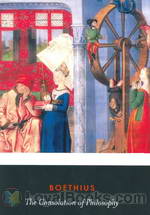 The Consolation of Philosophy
The Consolation of Philosophy
Consolation of Philosophy (Latin: Consolatio Philosophiae) is a philosophical work by Boethius written in about the year 524 AD. It has been described as the single most important and influential work in the West in medieval and early Renaissance Christianity, and is also the last great work that can be called Classical. Consolation of Philosophy was written during Boethius’ one year imprisonment while awaiting trial, and eventual horrific execution, for the crime of treason by Ostrogothic King Theodoric the Great... | |
By: Plato (427-347) | |
|---|---|
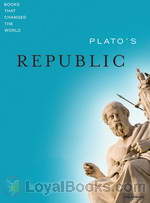 Plato's Republic
Plato's Republic
Plato's Republic is a Socratic dialogue which deals mainly with the definition of justice, the characteristics of a just city state and the just man. Although it was written more than two thousand years ago, many of the ideas and thoughts expounded here are still very much relevant to modern society. This is Plato's best known work and is also considered his most influential especially when it comes to the fields of philosophy and political theory. The Republic is divided into ten books and in each book Socrates discusses different topics from the immortality of the soul to the meaning of justice with his disciples like Glaucon, Thrasymachus, Adeimantus and others... | |
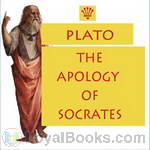 The Apology of Socrates
The Apology of Socrates
More than two thousand years ago, the great Greek philosopher Socrates was condemned to death for making seditious comments against the city state of Athens. His followers and disciples were legion. Ranging from Xenophon, the mercenary warrior and historian of the Peloponnesian War to the scholarly Plato, Socrates was described as the conscience-keeper of the nation, or the “gadfly” who would not let the massive machinery of the state rest in complacence. The Apology of Socrates by Plato was thought to have been written following Socrates trial and death in 399 BC... | |
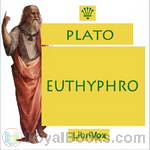 Euthyphro
Euthyphro
Awaiting his trial on charges of impiety and heresy, Socrates encounters Euthyphro, a self-proclaimed authority on matters of piety and the will of the gods. Socrates, desiring instruction in these matters, converses with Euthyphro, but as usual, the man who professes to know nothing fares better than the man who claims to be an expert. One of Plato’s well-known Socratic Dialogues, Euthyphro probes the nature of piety, and notably poses the so-called Euthyphro Dilemma: Do the gods love a thing because it is holy, or is a thing holy because it is loved by the gods? | |
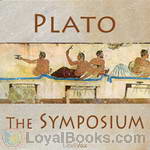 The Symposium
The Symposium
The Symposium (Ancient Greek: Συμπόσιον) is a philosophical book written by Plato sometime after 385 BCE. On one level the book deals with the genealogy, nature and purpose of love, on another level the book deals with the topic of knowledge, specifically how does one know what one knows. The topic of love is taken up in the form of a group of speeches, given by a group of men at a symposium or a wine drinking party at the house of the tragedian Agathon at Athens. Plato constructed the Symposium as a story within a story within a story... | |
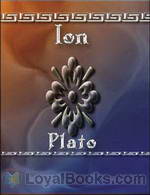 Ion
Ion
In Plato’s Ion, Socrates questions Ion on whether he should really claim laud and glory for his ‘rhapsodic’ recitals of Homer’s poetry. | |
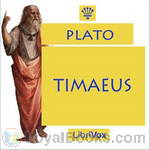 Timaeus
Timaeus
“Our intention is, that Timaeus, who is the most of an astronomer amongst us, and has made the nature of the universe his special study, should speak first, beginning with the generation of the world and going down to the creation of man…” ‘Timaeus’ is usually regarded as one of Plato’s later dialogues, and provides an account of the creation of the universe, with physical, metaphysical and ethical dimensions, which had great influence over philosophers for centuries following. It attributes the order and beauty of the universe to a benevolent demiurge – a ‘craftsman’ or god – fashioning the physical world after the pattern of an ideal, eternal one... | |
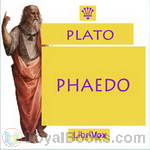 Phaedo
Phaedo
Plato's Phaedo is one of the great dialogues of his middle period, along with the Republic and the Symposium. The Phaedo, which depicts the death of Socrates, is also Plato's seventh and last dialogue to detail the philosopher's final days (the first six being Theaetetus, Euthyphro, Sophist, Statesman, Apology, and Crito).In the dialogue, Socrates discusses the nature of the afterlife on his last day before being executed by drinking hemlock. Socrates has been imprisoned and sentenced to death by an Athenian jury for not believing in the gods of the state and for corrupting the youth of the city... | |
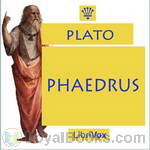 Phaedrus
Phaedrus
“For there is no light of justice or temperance, or any of the higher ideas which are precious to souls, in the earthly copies of them: they are seen through a glass, dimly…”Socrates and his earnest friend Phaedrus, enjoying the Athenian equivalent of a lunchtime stroll in the park, exchange views on love and on the power of words, spoken and written.Phaedrus is the most enchanting of Plato’s Erotic dialogues (capitalised in honour of the god). The barefoot philosopher urges an eager young... | |
By: Edward George Bulwer-Lytton (1803-1873) | |
|---|---|
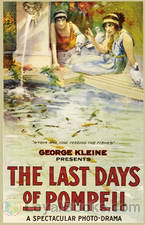 Last Days of Pompeii
Last Days of Pompeii
The Last Days of Pompeii, a novel by Edward George Bulwer-Lytton tells the love story of the Greeks Glaucus and Ione who were living in Pompeii when Mt. Vesuvius erupted and destroyed the city. But aside from telling their romance, the book is also full of insights about the decadent lifestyle of the Romans during the later part of their empire’s history. The different characters in the story represent the different civilizations which they come from. Glaucus, the main protagonist in the novel was portrayed as a handsome Greek nobleman... | |
By: James Fenimore Cooper (1789-1851) | |
|---|---|
 The Last Of The Mohicans
The Last Of The Mohicans
The Last of the Mohicans is an epic novel by James Fenimore Cooper, first published in January 1826. It was one of the most popular English-language novels of its time, and helped establish Cooper as one of the first world-famous American writers.The story takes place in 1757 during the French and Indian War, when France and Great Britain battled for control of the American and Canadian colonies. During this war, the French often allied themselves with Native American tribes in order to gain an advantage over the British, with unpredictable and often tragic results. | |
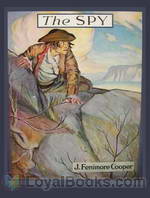 The Spy
The Spy
Between 1865-73 the tumultuous American Revolution rages on in different battlefields. The air is thick with hatred and suspicion as the Continental and British armies clash in bloody warfare. In Westchester County, New York, an area is considered a neutral ground for both forces, Harvey Birch plies his dangerous mission. An innocuous peddler by day, he is in fact an American spy, though he does nothing to correct anyone who assumes he is a British spy. In a magnificent country mansion, The Locusts, live the wealthy Whartons... | |
 The Pathfinder
The Pathfinder
Natty Bumppo goes by many names: La Longue Carabine, Hawk Eye, Leatherstocking, and in this tale, The Pathfinder. Guide, scout, hunter, and when put to it, soldier, he also fills a lot of roles in pre-Revolution upstate New York. An old friend, Sergeant Dunham of the 55th Regiment of Foot, asks him to guide his daughter through the wilderness to the fort at Oswego where Dunham serves. With the French engaging native Indian allies against the British and the Yankee colonists, such a journey is far from safe... | |
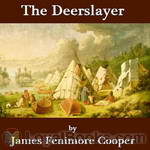 The Deerslayer
The Deerslayer
The Deerslayer, or The First Warpath (1841) was the last of James Fenimore Cooper’s Leatherstocking tales to be written. Its 1740-1745 time period makes it the first installment chronologically and in the lifetime of the hero of the Leatherstocking tales, Natty Bumppo. | |
 The Pioneers
The Pioneers
The Pioneers: The Sources of the Susquehanna; a Descriptive Tale is one of the Leatherstocking Tales, a series of five novels by American writer James Fenimore Cooper. The Pioneers was first of these books to be published (1823), but the period of time covered by the book (principally 1793) makes it the fourth chronologically. (The others are The Deerslayer, The Last of the Mohicans, The Pathfinder, and The Prairie.)The story takes place on the rapidly advancing frontier of New York State and features... | |
 Prairie - A Tale
Prairie - A Tale
The story opens with Ishmael, his family, Ellen and Abiram slowly making their way across the virgin prairies of the Midwest looking for a homestead, just two years after the Louisiana Purchase, and during the time of the Lewis and Clark Expedition. They meet the trapper (Natty Bumppo), who has left his home in New York state to find a place where he cannot hear the sound of people cutting down the forests. In the years between his other adventures and this novel, he tells us only that he has walked all the way to the Pacific Ocean and seen all the land between the coasts (a heroic feat, considering Lewis and Clark hadn’t yet completed the same trek). | |
By: Kate Chopin (1851-1904) | |
|---|---|
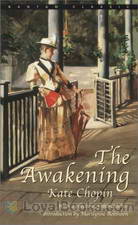 The Awakening
The Awakening
This book opens with a young wife and mother, vacationing at a resort in the Gulf of Mexico with her husband and children. The resort is run by an elderly Frenchwoman, who manages the place along with her two sons. The young wife and one of the sons develop a deep and passionate attachment to each other, with devastating effects on both families and their circle of friends. When Kate Chopin's 1899 novel The Awakening, originally titled A Solitary Soul, was first released, it evoked a storm of controversy... | |
By: James Baldwin (1841-1925) | |
|---|---|
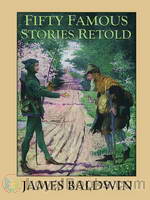 Fifty Famous Stories Retold
Fifty Famous Stories Retold
King Alfred and the Cakes. Damon and Pythias. The Sword of Damocles. Bruce and the Spider. These are stories that many people who grew up in the last century would be familiar with. They were included in our text books or to be found in anthologies in our school libraries. However, for a new generation growing up, some of these may be new and unknown. Hence, Fifty Famous Stories Retold by James Baldwin would indeed be a great addition to your children's bookshelf. James Baldwin, who shares his name with another famous American author was an editor, author and gifted teacher... | |
 Four Great Americans: Washington, Franklin, Webster, Lincoln. A Book for Young Americans
Four Great Americans: Washington, Franklin, Webster, Lincoln. A Book for Young Americans
Written for children, James Baldwin’s history of Washington, Franklin, Webster, and Lincoln brings these men to life in a way that will be interesting for adults as well. The stories touch on the little humanities of the great men, rather than dwelling on the great works and great events of their lifetimes, without ignoring the latter. | |
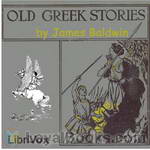 Old Greek Stories
Old Greek Stories
A retelling of old Greek stories involving mythological heroes and their adventures. Tales include those of Prometheus, Io, Perseus and Theseus. (Introduction by Iris McLeod) | |
By: O. Henry (1862-1910) | |
|---|---|
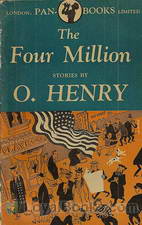 The Four Million
The Four Million
An impoverished but loving young couple sacrifices their most precious possessions to buy Christmas gifts for each other. A tramp who is desperate to be sent to prison so he can escape the winter cold. Two depressed laborers get their palms read by a Coney Island mountebank. A yellow dog who relates the story of a fat lady and her hen pecked husband. These and other unforgettable characters form part of absolutely delightful and unforgettable short story collection, The Four Million by O Henry. As the master of the “twist in the tail/tale” and the completely unexpected endings, O... | |
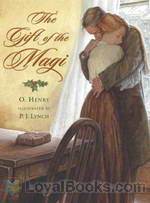 The Gift of the Magi
The Gift of the Magi
The Gift of the Magi is an O. Henry short story in which a young couple are very much in love with each other but can barely afford their one-room apartment. For Christmas, they each make a sacrifice to purchase a gift for the other, with ironic results. The moral of the story is that physical possessions, however valuable they may be, are of little value in the grand scheme of things. The true unselfish love that the characters, Jim and Della, share is greater than their possessions. O. Henry ends the story by clarifying the metaphor between the characters in the story, Della and James (or Jim), and the Biblical Magi... | |
 Cabbages and Kings
Cabbages and Kings
This work is O. Henry's first published volume and is considered to be his only novel. The plot is composed of several short stories, which were inspired by the author's six-month stay in Honduras in the late 1890s. "The incidents embracing as they do, a variety of subjects, hang loosely together, so loosely in fact, that at times one finds no apparent connection between them at all, and yet in the end one sees how each is intimately related to the other. ...Written by a less able hand than O. Henry's the book might have been a sad jumble, perhaps comprehensible to none but the Walrus--but as it is, one finds a joy in its every obscurity... | |
 Whirligigs
Whirligigs
A collection of short stories. | |
 Gentle Grafter
Gentle Grafter
If Jefferson "Parleyvoo" Pickens had appeared in print just a few years later, he might have been the "Gentle Grifter" instead of the "Gentle Grafter", the name O. Henry picked for him. His situation as an ethical graft artist gives Jeff an extra impediment in pursuing his craft, but he never wanted it to be too easy. The result is fourteen delightful tales for us and a number of new partners for him. With those partners (he always has at least one) he works his way through a number of confidence games... | |
 Heart of the West
Heart of the West
A collection of short stories by the legendary O. Henry. | |
 Waifs and Strays
Waifs and Strays
These 12 O. Henry stories all deal with waifs and strays in one way or another; people who have somehow become adrift in the current of life. Will they find their way on their own or be helped by kind hearted folk or perhaps, stay a waif and stray, somehow outside the normal life of society? All naturally have the wonderful O. Henry beautiful way with words and people. So if you are in the mood to enjoy some sensuous sounds and convoluted flowing phrases unique to William Sydney Porter, give these a listen. And of course the endings cannot ever be predicted. Ever! | |
 Options
Options
O. Henry needs no introduction of course; the man who made the short story with the surprise ending famous. These 16 stories are all wonderful examples of his word sculpting art. They include: "The Rose of Dixie"; The Third Ingredient; The Hiding of Black Bill; Schools and Schools; Thimble, Thimble; Supply and Demand; Buried Treasure; To Him Who Waits; He Also Serves; The Moment of Victory; The Head-Hunter; No Story; The Higher Pragmatism; Best-Seller; Rus in Urbe; A Poor Rule | |
By: John Bunyan (1628-1688) | |
|---|---|
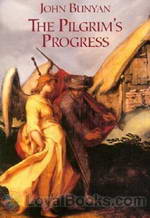 The Pilgrim's Progress
The Pilgrim's Progress
A journey that takes the hero, Christian, through the varied landscapes that constitute life and through the events that happen to human beings is the plot of The Pilgrim's Progress by John Bunyan. Readers who have read and loved Louisa May Alcott's Little Women would recall the many references to this 17th century work of religious fiction. The Pilgrim's Progress is based on several values based in the teachings of Christianity. The importance of using the Bible as a guiding principle in life, of traveling not just geographically but also spiritually, the emphasis on community living and of the companionship of fellow people and many other themes... | |